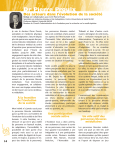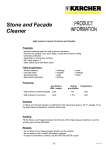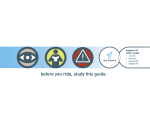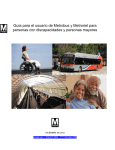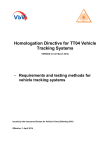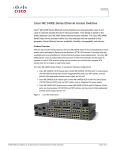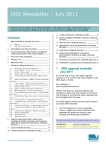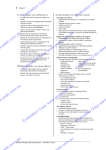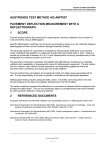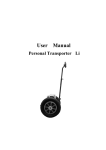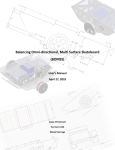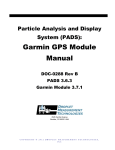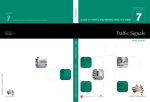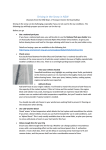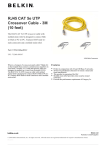Download A guide for choosing and using motorised mobility devices
Transcript
APRIL 2010 A guide for choosing and using motorised mobility devices: mobility scooters and electric wheelchairs keeping victorians connected Acknowledgements Contents VicRoads acknowledges the contribution of the following organisations and individuals in reviewing this publication: Introduction 4 Who may use a motorised mobility device? 5 Think about your health 6 Choosing the right motorised mobility device 7 Dr Marilyn Di Stefano, School of Occupational Therapy, Latrobe University Dr Maree Dyson, Transport Accident Commission Ms Susan Dyson, Travellers Aid Disability Access Service Mr Nazim Erdem, Australian Quadriplegic Association Ms Eleanor Fergeus, Department of Human Services, Victoria Mr Andrew Gannan, Mobility Aids Australia Pty Ltd Mr Mark Grant, Department of Human Services, Victoria Ms Tricia Greenway, Arthritis Victoria Ms Mary-Ann Leithof, ParaQuad Victoria Ms Robin Lovell, School of Occupational Therapy, Latrobe University Mr Emilio Savle, Department of Transport, Victoria Ms Margaret Stevens, Disability Justice Advocacy Checks to make before each trip 13 Out and about 14 Road rules for pedestrians on motorised mobility devices 18 Rate yourself – can you be a safe user? 22 Thanks to Angela Lampard, Nillumbik Shire Council for assistance with photography, and special thanks to Simone Pilens and Bob Bruce for acting as models. Disclaimer This guide explains the legal requirements for pedestrians using motorised mobility devices. It is intended as a guide only. It does not purport to set out the full requirements of the law. For a complete knowledge of the road law, you should consult the appropriate Acts and Regulations. © VicRoads 2006 2 Who may use a motorised mobility device? Introduction The Victorian Government is committed to helping people to get around who have difficulty in walking. This is so that everyone can remain active members of our community. As we see more older and disabled people in our community, there will be more motorised mobility devices in use on our footpaths. It is essential that users do their part to keep themselves and other road users safe. They need to be aware of the road rules and use the devices responsibly and safely. VicRoads has produced this Guide following a recommendation from the Victorian Parliamentary Road Safety Committee. This Guide applies to motorised devices for use by people who are unable to walk or have difficulty in walking. These devices are: mobility scooters electric wheelchairs. Under the Road Safety Act (1986) and Road Rules - Victoria these devices: are not defined as motor vehicles and therefore cannot be registered must have a maximum capable speed of 10km/h on level ground and a maximum unladen mass of 110kg are to be used only by people with an injury, disability or medical condition which means they are unable to walk or have difficulty in walking. People who do not have difficulty in walking are not permitted to use them. People using these devices or manual wheelchairs are considered pedestrians, and therefore must obey the same road rules as pedestrians. These road rules are explained on page 18. There are Australian Standards for the construction of motorised mobility devices. These have been written by experts in the area to ensure that these devices are safe for people to use and do not put other people using roads and footpaths at risk. These standards for motorised mobility devices are voluntary. This means that suppliers may legally sell devices that do not meet the Standards. It is strongly recommended that you request a written statement of compliance with the Standards from the supplier whenever you buy or hire a device. A summary of the relevant standards is on page 10. 4 If you are not capable of walking or have difficulty in walking you may use a motorised mobility device. Your doctor can help you make this decision or may refer you to an occupational therapist for further assessment. It is illegal for anyone else to use such a device on a footpath or a road. Mobility scooters are designed for use outdoors and for travel on footpaths. Electric wheelchairs are generally designed for indoor use, but can also be suitable for outdoor use. 5 Think about your health Choosing the right motorised mobility device Get independent advice In deciding to use a motorised mobility device, consider your health. For people who have difficulty walking, these vehicles give mobility. Walking is a gentle form of exercise that helps to keep you fit and reduces the possibility of other health problems. You should make a practice, if possible, of walking short distances. When discussing a motorised mobility device with your doctor and occupational therapist, make sure you ask about exercise and diet. Just as for driving a car, you need to be sure that you are able to operate a motorised mobility device safely before you buy it. 6 Eyesight, reaction time, sitting balance and posture, and clear thinking are important considerations. Your doctor and occupational therapist will be able to provide advice. You should also use the checklist on page 22. Motorised mobility devices can sometimes be modified after purchase, but this can be expensive. So it is important to make sure the device is easy to use before you buy it. If you are considering getting a motorised mobility device, it is important that you get independent and expert advice before buying. To make sure that your investment is a good one, you need to know before you pay, that it will suit your needs. Make sure you deal with an experienced and reputable supplier, but remember that few salespeople will be qualified to assess your needs. Ideally, you should ask your doctor for a referral to an occupational therapist. Occupational therapists are trained to help you live your life as independently as possible. They will assess your individual abilities and needs, your local environment and the features you need to ride safely and legally. They can also advise you on cost subsidies that may be available in certain circumstances. Which device should you choose? Motorised mobility devices vary in design, size, features and price. If you have some limitations using your hands, pay particular attention to the controls – different designs suit different people. Modified controls for operation by arm, chin or head are available. Technology is improving rapidly. It is now possible to customise mobility devices for many people. Once again an expert such as an occupational therapist will be able to help. Talk with your family and don’t rush your decision. Carefully consider how you plan to use your new device and the places you will be travelling to. Ask yourself: How far do I need to travel? Will I be able to make all trips along footpaths? What surfaces will I be travelling over? Smaller devices, devices with smaller wheels and devices with three wheels may be less stable over uneven surfaces.It is also important to choose a device that is suitable to your weight and build as the size and weight of the rider can affect stability, especially when turning. Should you buy or hire? Think about how long you will need the device. If it is only for a short time while you recover from an illness or injury then hiring may be cheaper. If you need the device on an ongoing basis then buying may be the better option. A good supplier should let you trial a device and will offer after sales service. You may be able to buy a device second-hand, but make sure it suits your needs and is in good working order. Have it checked by a qualified service agent. Have the battery tested, because these can be expensive to replace. Ensure there is a local service agent for the scooter and that spare parts are readily available. 7 9 Important features Reflective flag A fluorescent orange flag on a pole attached to the device is important for safety. This helps you to be seen more easily by other pedestrians and motorists, especially in places such as shopping centre car parks. The flag should be at head height when standing beside the device, but no more than two metres above the ground. Key-operated on/off switch A key-operated switch that immobilises the device makes it much more difficult for other people to improperly use the vehicle. Luggage carriers These are good for transporting small loads but may restrict the manoeuvrability of your device. Make sure your shopping does not obscure your view to the back and the sides or obstruct the controls. Your safety, and the safety of others, is the most important consideration. You must be able to see traffic and pedestrians in all directions. Arrange for delivery by taxi or collection by a friend if your load is too big. Headlight and tail lights On dull days or at night, they might save your life! The type of LED (Light Emitting Diode) lights that are used on bicycles are very bright. They use little electricity and are less likely to drain the battery. In order to make your device highly visible at night, the bottom of each light (white on the front and red on the back) should be a minimum of 350mm above the ground. Tie down points Strong tie down points enable your mobility device to be safely restrained in a wheelchairaccessible taxi. Ask about having them fitted before you make your purchase. 8 Reflectors or reflective tape These should be white on the front, yellow on the sides and red on the back. Reflectors or reflective materials make it easier to be seen on dull days and at night. Reflectors for bicycles are suitable, or use a Class 1A reflective tape. Clearance lights When you are crossing a road, it can be difficult for motorists to see your headlights or tail lights. Static (non-flashing) yellow clearance lights on the side of your device also make it easier to see you on dull days and at night. Yellow LED (Light Emitting Diode) lights are very bright. They use little electricity and are less likely to drain the battery. These clearance lights should not be flashing because they could be confused with turning indicators. Mirrors These are to help you to see pedestrians and traffic beside you and behind you. While not required by the Standards, mirrors are a useful aid to keep you and other road users safe. 11 Complying with rules and Australian Standards Questions to ask the supplier How useful is the user manual? There are two essential questions to ask before you buy or hire a motorised mobility device: How much does it cost? Make sure you know all the costs before you buy or hire. You need written instructions on how to operate and maintain your motorised mobility device and the supplier is required to supply a user manual. 1. Does it comply with Road Rules – Victoria? 2. Does it meet the Australian Standards for motorised mobility devices? It is important that before you buy or hire, ask the supplier for a written statement that the device complies with the following road rules. It: is designed to carry one person must have a maximum capable speed of 10km/h on level ground and a maximum unladen mass of 110kg. Standard AS 2142 AS 3696 AS3744.1 ISO 7176-7 10 Name of Standard Reflectors for pedal bicycles Wheelchairs The Australian Standards are voluntary, and some motorised mobility devices may not meet the standards. The standards are designed by experts to improve your safety and the safety of other road users. They can be purchased from Standards Australia. See the website: standards.org.au Any supplier should be aware of the Australian Standards. It is not necessary that you know about the standards in detail. However, it is important that you ask for a written statement that your motorised mobility device complies with all of the standards that are listed below. What it deals with Acceptable types of reflectors for visibility 3696. Static stability 3696.2 Dynamic stability 3696 3 Efficiency of brakes 3696.4 Energy consumption 3696.5 Overall dimensions, mass & turning space 3696.6 Maximum speed, acceleration & retardation 3696.8 Static, impact & fatigue tests 3696.9 Climatic tests 3696.10 Obstacle climbing ability 3696.14 Power and controls Ignitability of upholstery Smouldering cigarette Wheelchairs – seating Size of & accessibility to seat dimensions If buying, will the supplier allow me to use the wheelchair or scooter for a trial period before purchase? If buying, what is the price to buy it? If hiring, what is the hiring fee and deposit? What is the TOTAL cost to me? What is the warranty like? A warranty protects you from loss if the device is faulty. Is there a written warranty? Does the warranty cover parts and labour? How long does the warranty last? Who arranges and pays for delivery of the device to an authorised repairer while under warranty? Do I get a replacement while mine is being repaired under warranty? What back-up service is provided? Is training provided on how to use the device? Is help provided if you need advice? Does the supplier do servicing and repairs? Is the manual simple and easy to understand? Are the following instructions clear? How to recharge the batteries Basic maintenance that you should do at home How to change light bulbs, and what light bulbs to buy What can it do? What can’t it do? Above all, the device must meet your needs and be able to cope with the trips you plan to make. What is the top speed on level ground? What sort of hill can it climb? Can it climb over kerbs and gutters? How does it cope with the different surfaces I plan to travel on? How long will fully charged batteries last? Can it be transported? Can it be safely restrained in a wheelchair-accessible taxi? Can it be manoeuvred onto a bus, and off again without having to back out? Checks to make before each trip What equipment does it come with? You will need some basic equipment to keep your motorised mobility device working properly. Is a battery charger included in the price? Are there clear instructions on how to charge the batteries and how to care for them? Is there a gauge for checking tyre pressures? Make sure you buy a spare tube. Are there spare globes? What about the initial set-up? Your supplier may be able to reprogram the controls to make your selected device drive more evenly. Can the controls be set up to suit me and my abilities? Can I contact the supplier with any questions later? What about servicing? There will be some servicing that needs to be done by experts. Are spare parts readily available for this brand and model? 12 Where can servicing be done? Will the servicing company collect and return the motorised mobility device? If they have to keep it for an extended period, will the servicing company provide a replacement? How often does it need to be serviced? How much will a service cost? Will the servicing company provide a statement that all equipment is working in accordance with specifications? What about breakdowns? It is important to know what service is available if there is a breakdown and you are away from home. If hiring, is breakdown insurance already arranged? If buying, what insurance is available and how much does it cost? The RACV provides a breakdown service membership – call 13 19 55 for details. You can also check with other breakdown service companies. Batteries Are the batteries fully charged? How long can I travel on fully charged batteries? Tyres Are the tyres inflated to the correct pressure? Under-inflated tyres may cause stability problems. Your judgement Are you fit to drive? Have you recently been unwell or taken medicines or alcohol that may affect your judgement? Have the dosages of your medicines been changed recently? If your health has declined, should you check with your doctor before you go out? Seat Is the seat adjusted to the correct height? Some seats turn sideways to make it easier to get on. If your seat does this, make sure it is facing forwards and locked in position before you move. Weather Is it sunny outside? Do you need a hat and sunscreen? Is it wet outside? Do you need a rain coat? If it’s wet make sure that the controls are protected from the weather. Be very careful that clothes, umbrellas or canopies do not make it hard for you to watch and listen for traffic. Clothing Are you dressed appropriately for the weather? Are you wearing light-coloured clothing so you can be seen more easily? Mobile phone Do you have a mobile phone? This makes it is easy to contact someone if you have a problem. Identification Do you have a waterproof label on the device with your name and mobile phone number? This enables others to contact you in the event of loss or if your device is obstructing entrances. If you are carrying bags, shopping or parcels, be careful about the extra weight and the effect it may have on the balance of your device. Your load Make sure that any parcels you are carrying do not get in the way of controls. Do not let these items restrict your view or obscure your lights in the front, to the back or to the sides. 13 Out and about Your responsibilities when using your motorised mobility device Safety of others Be seen Keep control You need to be very careful and slow down when near other people, especially pedestrians, cyclists and children. You should make sure that your motorised mobility device complies with Australian Standards – see page 10. These are there for your safety and the safety of other road users. You should make sure that your motorised mobility device is clearly visible to pedestrians and to motorists on dull days and at night. Use the lights and reflectors recommended on page eight. and wear light-coloured clothing so you can be seen more easily. Remember that it can be quite dark outside even at 5pm in winter! Make sure that the controls of the vehicle are designed so you can operate them safely with your particular disability. An occupational therapist can help you choose the best device to suit your condition. It is highly desirable that you take out public liability insurance. In the event that your motorised mobility device injures someone or damages property, public liability insurance will protect you from having to pay for medical treatment or property repairs. Check with your home insurance company as they may cover use of a motorised mobility device. Have the right insurance You should also seriously consider insuring the device against theft and damage. It will be expensive to replace if it is stolen. It may also be expensive to repair damage. Insuring against theft or damage will reduce these costs. 15 Getting there safely Plan to use streets with footpaths Footpaths are safer than roads. If there are no footpaths, plan to use quieter roads. Avoid uneven surfaces, dips and potholes. Avoid hills where possible Climbing hills uses more battery power. Going down hills puts more strain on your balance as well as your brakes. If you must travel up or down a hill, do so slowly. Make turns slowly The faster you take a turn, the more danger there is of tipping over. Approach ramps and kerbs headon Do not approach ramps or kerbs at an angle – there may be a danger of tipping over. Take care on country roads Country roads often do not have footpaths and may also have rough edges. Generally, cars travel faster on country roads. Avoid country roads if possible. If you must use a country road, stay as close to the kerb as possible, facing oncoming traffic. Use your lights, even at daytime, and watch carefully for traffic. Return to the footpath or nature strip as soon as possible. Be careful around parked cars Never approach too close to the back of a parked car. Be aware that drivers may not be able to see you, especially when they are reversing. If you must cross the road near a parked car, cross in front of the parked car. Do not park near moving cars or machinery. Be aware of how vulnerable you are around larger, faster-moving vehicles. Breakdown insurance may be another useful investment. This is available from companies that provide a breakdown service for cars. The RACV provides a breakdown service membership – call: 13 19 55 for details. You can also check with other companies. This Metlink brochure has useful information about using public transport with your motorised mobility device. 14 17 Crossing roads Sharing footpaths Choose the best place to cross the road Pedestrian crossings and traffic lights are the safest places to cross roads and they are better lit at night. You can also use children’s crossings (school crossings), but make sure the flags are displayed. Where there is no crossing facility, choose a straight section of road with few parked cars and good visibility. At night cross where there is plenty of street lighting. Look before crossing roads There may be a ramp on the near side of the road, but is there a ramp on the other side of the road? You could get stuck on the road. Check that you can get off the road on the other side before starting to cross. Avoid crossing at roundabouts You must give way to motor vehicles. Motorists have to look in many different directions at roundabouts and it may be hard for them to see you. Use pedestrian crossings or traffic lights if possible, otherwise cross at a well-lit, quiet, straight section of road. Make sure you Make eye contact with drivers before leaving the kerb. have been Wear light coloured clothing – especially in bad weather and seen by drivers at night. Keep left Where possible, keep left to allow room for other pedestrians to pass. Be careful changing direction Look behind and to the sides before changing direction. Your vehicle can injure people. Make use of your mirrors when you have to change direction. You must also turn your head and check behind – mirrors do not show the whole scene behind you. Use mirrors all the time Check your mirrors frequently. Be aware of the location of cars and pedestrians behind you, so that you can take action quickly in the event of an incident. Be responsible Other footpath users can reasonably expect you to behave responsibly. Listening to music or radio on headphones, or using your mobile phone, may distract you from the important job of keeping other people safe. One at a time Do not travel alongside another motorised mobility device on the footpath or road. Have consideration for other road and footpath users. Travel in single file. Stopping Crossing railway and tram tracks Cross railway level crossings only at pedestrian crossings Getting caught in railway lines can have deadly results. Cross railway lines on pedestrian cross-overs and cross the rails at right angles. Cross tram tracks with care Cross tram tracks at right angles. There is a danger of being caught in tram tracks. Try to cross at pedestrian crossings or traffic lights, then if you do get caught in tracks there may be other pedestrians to help you. How to cross railway and tram tracks Cross as near as you can to an angle of 90 degrees to the rails. 16 Turn off Before getting on or off, make sure that the motor is switched off. You may accidentally hit the control when getting on or off. Make sure the brakes are on before you get off. Slopes Try not to stop on slopes. This puts an extra strain on brakes. Your device will be less stable on slopes. Avoid turns if possible, when going up or down a slope. Keeping clear Do not obstruct doorways, gateways or driveways when you stop. Be considerate of others. Parking or stopping where vehicles are moving can be dangerous, as your device is smaller than cars and may be difficult to see. Stopping or parking in such places may result in damage to your vehicle and injury to you or to others. Stop to one side Other people have to use footpaths as well. Try to park your vehicle so that other people, including children on bicycles and others using mobility devices and prams can move along the footpath freely. Road rules for pedestrians on motorised mobility devices Motorised mobility devices are designed to be used on footpaths. The road rules that apply to users of motorised mobility devices are the road rules that apply to pedestrians. It is important that you know the rules and obey them. A licence is not required to use a motorised mobility device. Crossing the road You must cross a road by the shortest direct route. You must not jaywalk. You must not obstruct traffic. 19 Crossing at roundabouts Avoid crossing roads near roundabouts. If you do use them leave the kerb when there is no traffic on the roundabout. You must give way to all motor vehicles on or entering a roundabout. Intersections with no lights or signs Avoid crossing in these locations. You may start to cross the road if there are no cars travelling along the road you are crossing. But check carefully for cars turning into the road you are crossing. The drivers may not have seen you. You must not start to cross a road in front of a car driving along the road you are crossing. You must not start to cross a road if there is danger of a collision. Crossing at lights When crossing at traffic lights without pedestrian signals, you may start to cross on the green light only. You may leave the kerb when the signal is green. You must not leave the kerb if the signal is yellow or red. When crossing at pedestrian lights you must obey the ‘walking man’ signals. You may leave the kerb when the ‘walking man’ is green. You must not leave the kerb if the ‘walking man’ is red. If you are already on the road and the red ‘walking man’ is flashing, you may cross to the nearest safe place. 18 Using the footpath You must not travel along You must use a footpath or nature strip if one is available and safe to use. a road if there is a suitable footpath or nature strip that can be safely used. If there is no suitable footpath or nature strip, and you need to travel on the road, you must travel facing the oncoming traffic. Separated footpath On a separated footpath, you may travel on either the part of the footpath marked for pedestrians only or the part marked for bicycles only. However, it is recommended that you travel on the pedestrian path. 21 ‘Bicycles Only’ path When crossing a ‘Bicycles Only’ path, let bicycles pass before you cross the path. When crossing a bicycle path, you must give way to cyclists. No Pedestrians’ sign You must not travel past a sign banning pedestrians. 20 RECHARGE scheme — ‘You have the power’ As a motorised mobility device user you would understand how important it is to plan your trip so you have enough charge in the battery. The RECHARGE scheme is about encouraging businesses in your community to provide a power point so you can recharge your battery, if required. RECHARGE stickers are displayed on the windows of participating businesses so you can easily find them. It’s about giving you more confidence to get to and from your destination, knowing support is available. This scheme was first developed in the Shire of Nillumbik and based on its success, is becoming available in many locations across Victoria. The RECHARGE scheme is a state funded MetroAccess initiative, in partnership with local businesses and Mobility Aids Australia. For more information visit the website: rechargescheme.org.au or telephone your local council and ask for the MetroAccess Officer (metropolitan areas) or RuralAccess Officer (rural areas). Rate yourself – how safe are you? Your safety is important. The safety of other people is important too. Answer these questions before you buy or hire a motorised mobility device. Rate yourself again on a regular basis (every six months) after you start using your device. If you are unsure, ask a family member or trusted friend. You can also ask your doctor. Your doctor might refer you to an occupational therapist just to be sure. 23 Eligibility to use Am I unable to walk or have difficulty in walking? Health benefits and costs Walking is a mild exercise that is good for health. Does added mobility justify possible costs to my health? Coordination and strength Can I operate the controls? Can I turn the key; adjust the dials; use the accelerator and brake? Can I steer the device and turn around tight corners? Can I turn my head to look to the side? Can I turn my head to look behind when reversing? Physical balance and endurance Can I keep my balance when travelling over rough and uneven ground? Can I adjust my body position when travelling up and down slopes like ramps and hills? Can I stay sitting down for extended periods of time? Can I stand and walk for short distances? 22 Vision Thought process and memory Can I detect and move around obstacles in my field of vision? Can I remember how to operate all the controls? Can I detect moving objects and avoid collisions? Can I remember the road rules? Can I detect things to the sides while I am looking ahead – things like cars and pedestrians around me? Perception Can I judge distances correctly? Can I judge the speed of my own motorised mobility device and other vehicles and pedestrians? Can I concentrate for lengthy periods whilst riding? Can I react quickly in order to stop or turn in an emergency? Feelings and judgement Can I stay calm in difficult situations? Can I be patient with other people and traffic? Can I make good judgements to protect myself from injury and to keep others safe? keeping victorians connected VRPIN01671/8 03.11 S.C 96586 For further information please phone 13 11 71 or visit vicroads.vic.gov.au













